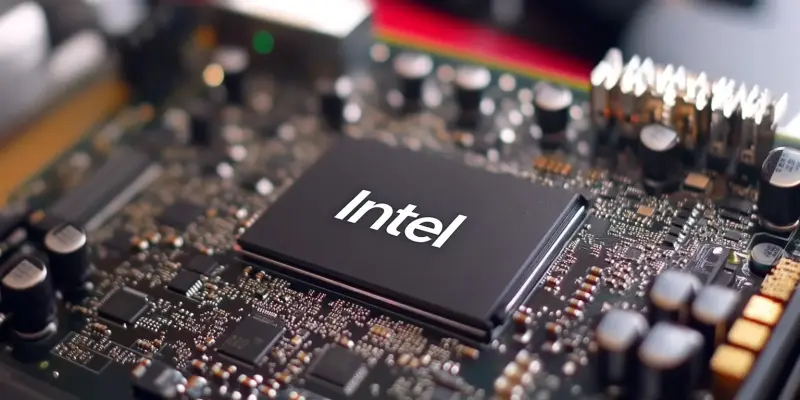Intel’s recent announcement marks a significant shift in its strategy for AI and HPC workloads. The company declared that its Falcon Shores GPU, initially planned for market release, will instead remain an internal test processor. This development will help Intel refine its hardware and software frameworks for the next-generation GPU, codenamed Jaguar Shores, which is anticipated to serve AI data center needs more comprehensively. This change in plans means that Intel’s Gaudi 3 processor, despite facing adoption challenges and software issues, remains the company’s principal AI solution for the next two years.
Intel’s Strategic Shift for AI and HPC Workloads
The Decision Behind Internal Testing
During a recent earnings call, interim co-CEO Michelle Johnston Holthaus highlighted that Intel will focus Falcon Shores on internal testing to perfect hardware and software integration. This decision stems from industry feedback that cautioned against launching an unprepared product that might tarnish Intel’s reputation. Falcon Shores, characterized by its multi-chiplet design featuring Xe-HPC GPU chiplets, was originally intended to boost performance and efficiency for AI and HPC applications. Although the specific performance metrics were not disclosed, the internal test designation suggests Intel is committed to refining the ecosystem before any market introduction.
This strategic move indicates that Intel is taking a cautious approach by ensuring that Falcon Shores is fully optimized before any potential commercialization. The multi-chiplet design of Falcon Shores holds the promise of advanced scalability and customization, essential features for addressing diverse AI and HPC needs. However, Intel’s projection for continuous innovation in the AI sector necessitates a polished product that minimizes software issues and maximizes adoption rates. The focus on internal testing, therefore, is not merely a delay but a calculated step toward delivering a flawless GPU solution—one that integrates seamlessly with Intel’s existing and future tech stack.
Long-term Goals Over Immediate Market Presence
The overarching trend suggests Intel is prioritizing long-term strategic goals over immediate market presence. By shifting focus to Falcon Shores’ successor, Jaguar Shores, Intel aims to develop rack-scale solutions that can more effectively compete with Nvidia’s AI dominance. This strategy involves leveraging Falcon Shores internally to avoid the pitfalls of releasing a premature product. The testing phase will serve as the proving ground for technological innovations and refinements that will be integral to Jaguar Shores’ success.
Additionally, Intel’s decision not to commercialize Falcon Shores even for limited external distribution is notable. Unlike previous instances, such as the Xeon Phi’s limited availability to select developers, Falcon Shores will not be provided to independent hardware and software vendors. This underscores a strategic pivot, emphasizing the internal development of a robust ecosystem around forthcoming high-performance GPUs. Intel’s commitment to this developmental phase may delay market entry, but the long-term benefits of a thoroughly vetted, mature product are anticipated to be substantial.
Commitment to AI and Performance Efficiency
Internal Ecosystem Development
In summary, Intel’s current approach focuses on rigorous internal testing with Falcon Shores to lay a strong foundation for the next-gen Jaguar Shores GPU. This move, intended to avoid potential market disappointment, reflects a deliberate, long-term strategy to ensure competitiveness in the AI sector against industry leaders like Nvidia. The decision underscores Intel’s commitment to achieving superior performance and efficiency through meticulous hardware and software development, prioritizing robust solutions over immediate market gains. By choosing to channel resources into extensive internal testing and refinement, Intel aims to position Jaguar Shores as a notable contender in the AI and HPC realms.
The decision to withhold Falcon Shores from commercial distribution allows Intel to funnel insights and improvements directly into Jaguar Shores, fostering an ideal environment for next-gen GPU development. This approach not only safeguards Intel’s reputation but also aligns with the broader industry trend toward producing highly efficient and purpose-built AI accelerators. The focus on internal ecosystem development will enable Intel to anticipate and address potential technical challenges, ensuring that Jaguar Shores emerges as a well-rounded solution. This preemptive optimization strategy signifies Intel’s forward-thinking vision and commitment to sustaining and expanding its footprint in the high-performance AI market.
Future Implications and Industry Impact
Intel recently announced a major shift in its strategy regarding AI and high-performance computing (HPC) workloads. Originally, the company planned to release the Falcon Shores GPU to the market, but it has now decided to keep it as an internal test processor. This pivot will allow Intel to better refine and develop its hardware and software frameworks in preparation for the next-generation GPU, codenamed Jaguar Shores. This future GPU is expected to better meet the demands of AI data centers.
As a result of this change, Intel’s Gaudi 3 processor remains the core AI solution for the company over the next two years, despite encountering some challenges with adoption and software integration issues. By focusing on internal testing and development of the Falcon Shores GPU, Intel aims to improve its competitive positioning in the AI and HPC markets with the upcoming Jaguar Shores. The strategic shift underscores Intel’s commitment to advancing its AI and HPC capabilities while addressing existing shortcomings in its technology and solutions.

